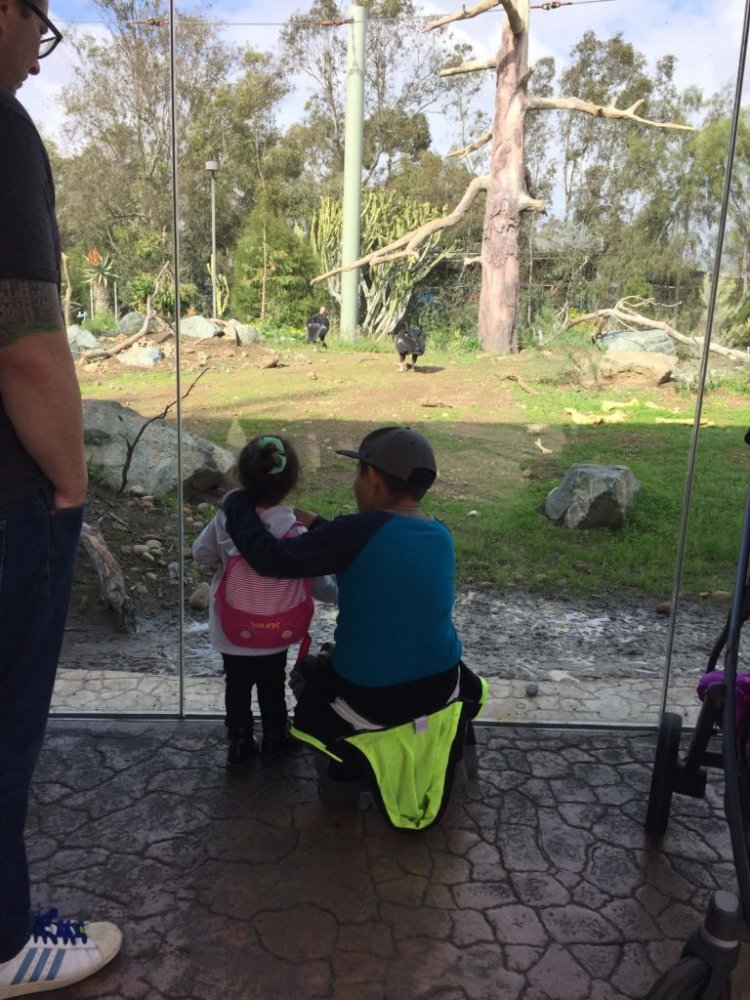
[Photo: Guest writer Alejandra’s children]
I have been married for ten years. My husband and I met when he was sixteen years old and I was twelve. I was visiting my best friend’s family when he arrived from Guatemala. I was one of the first people that he met when he arrived that wasn’t family. I knew when I met him that he was special and that he had gone through a hell of an ordeal to get to the US, but it wasn’t until I was seventeen that we started to talk after years of not knowing much of each other.
We married when I turned eighteen, and months later I had our first child. We were a poor couple, my husband worked two jobs and I worked and went to college. My husband’s first attempts at becoming a resident had not been successful; his family (legal citizens of the US) requested asylum for him but it was denied on the grounds that he did not come from a country under civil war. Now when we are more economically stable and trying again to find a way to make him a resident, a president has been elected that could destroy those hopes with the swift flick of a pen.
It never once occurred to me that his illegal status in this country was going to bring us hardship. But the last few months, as rhetoric against “illegal immigrants” has increased and become more violent, I have been filled with worry, uncertainty, uneasiness, distress, and a myriad of other words signifying heightened levels of anxiety. The day of inauguration has come and gone and I fear for the fate of my small family.
The discouraging campaign and election of Donald Trump has brought me to tears at times. I have watched news reports of violence toward African Americans and against Latinos. I’ve read news articles from trusted news sources about incidents where school children have chanted “build the wall” and other discriminatory remarks towards children of immigrant descent. My two children are citizens of this country and do not risk losing that citizenship, but they know that their father could be torn away from them and deported.
Donald Trump has accused immigrants of being criminals and rapists that are here to steal American jobs and bring in drugs. And yes, Mr. Trump has since then “clarified” those remarks stating some Latinos and immigrants are hard-working, especially those that are here through the proper channels. The truth is that Mr. Trump does not know the immense difficulty that families face when things are so desperate that families must escape their home countries. Obtaining a visa to come into this country legally is not easy, and not cheap. Most families fleeing violent countries are not the affluent ones, but those that cannot afford to feed their families.
My husband’s family brought him and his younger brother to the United States when they were sixteen and nine years old respectively, because of the extreme gang violence in Guatemala City Guatemala, where they lived. My mother-in-law had worked secretarial jobs as well as an artisanal job making traditional Guatemalan dolls and selling them in the streets, and my father-in-law had been a school teacher.
My husband grew up in border territories between the Mara Salvatrucha gangs – MS 13 and MS 18 – and as a young teenager was constantly harassed to join one or the other. He suffered several violent beatings by gang members; and after gang members went to his school with homemade guns and threatened his life, he lost so much weight that his mom pulled him out of school.
Unfortunately running from this type of violence is not enough to grant you asylum in the United States. To be granted asylum in the US, you must prove that you come from a country torn apart by civil war and are being persecuted in your own country. Typically, a person applying for asylum is requesting this at a port of entry to the US, such as a border crossing, airport, or seaport or if you’re already in the US you can do so by filing form I-589. If, after you’ve applied for asylum, the judge on your case decides you do not qualify you are issued a deportation order, you must leave the country for ten years, and if you want to return you cannot reapply for asylum.
This is a heavy burden to bear, but for a seventeen-year-old with the hopes of a new life, it was terrifying. A deportation order forces a person to live with a symbolic scarlet “I” upon your chest – signifying your illegal status – that leads to discrimination – not because of anything you’ve done or anything you are, but because of stereotypes created by many years of bigotry. That “I” tells people that you are not worthy of equal treatment, even though you work hard and have dreams of a good life. Over his ten years as a handyman, my husband has been insulted by many people: he has been told to go back to his country, to learn to speak English (which he speaks very well), he’s been called many derogatory names, as well. But even so, he has not lost hope in the possibility of not only becoming a resident of this country, he maintains his belief in the goodness of people.
As his wife, I’ve received poor treatment from those working in government public assistance programs. To be able to provide health insurance for my son, I had to apply for Medi-Cal and the social workers often told me that my husband’s status did not bode well for me, even though I was a legal resident. My children have never been denied healthcare, and we pay taxes on my husband’s income. But people still ask why I married “an illegal”; I ignore the comments, and I remind myself that my husband’s only crime was wanting to live past the age of seventeen.
It is painful to listen to news stories of hard working Americans that blame the loss of jobs to illegal immigration, and who call for those illegal immigrants to be deported, especially, when many immigrants are working jobs that no one else wants. After working on a cattle ranch, and attempting to hire people for positions of back-breaking labor, I learned most people are turned off by the offer of $11 per hour– unless you are an immigrant, who will take any job that pays, because you have no other choice.
Our country has failed its people, and I do mean OUR country because I have not known any other country other than this. I am proudly Mexican by heritage and culture, but I would not want to live anywhere other than here. It is disheartening that our country has divided itself, and in that division a man has been elected that has promised to deport every illegal. He may start with the criminals, but very likely continuing with those who want to be residents but cannot afford it yet.
Although the future seems bleak, I must still hold on to hope for my family – hope for a future where my children grow up with their father. And despite my daily challenges and fears, I also hold on to hope for a government that is still committed to not turning its back on the tired, poor, huddled masses yearning to be free.
 Alejandra Godinez is a hardworking wife and mother of two, working as a registered behavior technician in the field of Applied Behavior Analysis. She is currently applying to graduate programs for clinical psychology, and enjoys writing as a hobby.
Alejandra Godinez is a hardworking wife and mother of two, working as a registered behavior technician in the field of Applied Behavior Analysis. She is currently applying to graduate programs for clinical psychology, and enjoys writing as a hobby.


Grok Nation Comment Policy
We welcome thoughtful, grokky comments—keep your negativity and spam to yourself. Please read our Comment Policy before commenting.